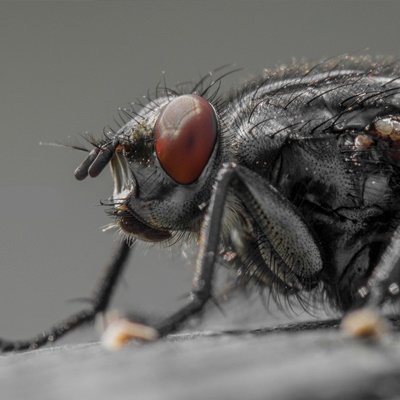
Characteristics
Blow flies are so called because they were believed to “blow” their eggs, or larvae onto exposed meats. They all like sunlight and are attracted to meat or carrion, and all may be found around dustbins in hot summer weather.
Diet
Their feeding habits (they vomit onto food to soften it up) and filthy feet, infect food, especially meat products, as they feed or seek egg-laying sites. Their Latin names indicate their habits; Calliphora vomitoria, Sarcophaga carnaria and Cyanomyia cadaverina are but three members of the group with a great capacity for transmitting the bacterial agents of food poisoning.
For more information see also Bluebottle, Greenbottle and Flies.

Why control Blow Flies?
Flies are widely recognised as carriers of disease-causing organisms, and their high mobility makes them particularly effective vectors. They acquire these pathogens whilst crawling or feeding on infected materials such as waste, and may then subsequently infect human food when they alight on it. This transfer may occur simply as the fly walks on the food, but will also take place as a result of the fly's defecation and regurgitation.
The simple presence of numbers of flying insects may be an irritating nuisance to staff, customers. Clearly, the threshold at which many guests, customers, or the public become upset by insects is relatively low, and unhappy customers lead to complaints.
 In any food production or sales environment, the local Environmental Health Department has a responsibility to enforce food safety and environmental health legislation. Typically EHOs will work with and advise businesses where potential insect issues are present. However as a last resort, and where advice has not been heeded, then legal action may be taken against offenders, potentially leading to more negative exposure for the business. This negative publicity can have a significant impact on the public's and customers' perception of the brand. This, in turn, is likely to affect the business itself.
In any food production or sales environment, the local Environmental Health Department has a responsibility to enforce food safety and environmental health legislation. Typically EHOs will work with and advise businesses where potential insect issues are present. However as a last resort, and where advice has not been heeded, then legal action may be taken against offenders, potentially leading to more negative exposure for the business. This negative publicity can have a significant impact on the public's and customers' perception of the brand. This, in turn, is likely to affect the business itself.
How to get rid of Blow Flies
Find out more on our Flies advice page.
Having problems with Blow Flies?
Use a trained professional pest controller.
Search for your local BPCA member